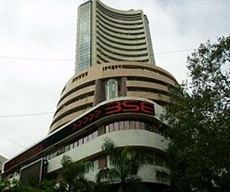Indian bourses continue free fall on Wall St cues, LTCG fears
06 Feb 2018
The domestic benchmark indices seem to be in a freefall mode, as the BSE Sensex tanked more than 1,000 points on Tuesday morning to 33,726 points, while the broader Nifty 50 fell by more than nearly 400 points to 10,276.08.
 The mayhem in the market today pulled down nearly 200 stocks to their respective one-year low levels on the BSE, with the benchmark Sensex nose-diving nearly 3.6 per cent in early trade.
The mayhem in the market today pulled down nearly 200 stocks to their respective one-year low levels on the BSE, with the benchmark Sensex nose-diving nearly 3.6 per cent in early trade.
The Sensex and Nifty felt the ripples of a global rout after Wall Street suffered its biggest decline since 2011 on Monday. It is a double blow for investors after the Sensex has lost nearly 2,500 points since the Long Term Capital Gains (LTCG) Tax was proposed by Finance Minister Arun Jaitley in his 1 February Budget.
The Sensex fell 1,275 points to 33,482 level intraday on Monday, a day after it closed 309 points lower as Dalal Street gauged the impact of LTCG tax on equities amid lower Asian markets.
The rupee plunged to its six-week low falling 29 paise to trade at 64.36 to the dollar. On Monday, the Indian currency closed flat at 64.07 against the US currency amid sharp losses in local equities.
Fears of higher interest rates and impact of rising inflation in the US led to the selloff in global markets. Potentially higher bond yields also dampened sentiments in US markets.
At home, investors were also wary of the outcome of the monetary policy review on Wednesday.
The stock markets had closed in the red for the fifth consecutive session on Monday. A market-wide sell-off pattern was observed in Indian equities as the US benchmark index Dow Jones Industrial Average tumbled as many as 1,175.21 points on Monday, posting its biggest intra-day decline in history shedding nearly 1,600 points.
The slumps in the benchmark S&P 500 index and the Dow Jones Industrial Average were the biggest single-day percentage drops since August 2011, a period of stock-market volatility marked by the downgrade of the United States' credit rating and the euro zone debt crisis.
Around 188 stocks including Aditya Birla Capital, Andhra Bank, Bajaj Hindusthan Sugar, BGR Energy Systems, Central Bank of India, Cummins India, Godfrey Phillips India, hit fresh 52-week lows on BSE as the Sensex lost about 1,275 points due to across-the-board losses after investor sentiment was hit by a sell-off in world markets.
Hindustan Composites, India Cements, Kalyani Steels, Max India, Max Financial Services, Monnet Ispat & Energy, National Fertilisers, Orient Bank of Commerce, Tata Motors, Union Bank of India, Uttam Galva Steels, Welspun India also joined the bandwagon of stocks that hit new 52-week lows on the 30-share index.
Extending its falling streak for the sixth straight session, the Sensex fell by 1,274.35 points, or 3.66 per cent, to 33,482.81 with all sectora indices led by realty, consumer durables, metal and banking trading in the negative zone.
Following the downfall, the total market capitalisation of BSE listed companies stood at Rs1,43,00,981 crore this morning, down from Rs1,47,95,747 crore on Monday.
While retail inflation hit a 17-month high in December and is expected to remain above the Reserve Bank of India's 4 per cent target over the coming 12 months, growth in Asia's third-largest economy likely slowed markedly in the fiscal year ending 31 March complicating the RBI's policy path.
In a move that could push inflation higher in coming months, finance minister Arun Jaitley increased government spending for rural areas and announced a larger fiscal deficit target in his annual budget speech last week.
Govt concerned
The government will look into what it can do after a slump in local market reflecting global sell off, finance secretary Hasmukh Adhia said today.
Adhia said he will discuss the issue of the fall in local markets with the finance minister.
Asked if the government will scrap or review the long-term capital gains tax, Adhia said the local markets are mimicking global weakness, ''but the government will look into what it can do''.
Volatility index VIX was trading 27.88 per cent higher at 20.53, signalling heightened volatility. The index is a measure of the market's expectation of volatility over the near term.
All Sensex components were trading in the red with Tata Motors (6.17 per cent) the top loser. This was despite Tata Motors reporting about a 13-fold rise in quarterly profit, driven by higher sales from its Jaguar Land Rover (JLR) business after a particularly weak quarter a year earlier.
The heavy sell-off comes after months of surges fuelled by corporate earnings, global outlook and optimism over the US economy.
Foreign institutional investors sold equities worth Rs 1,263.57 crore in yesterday's trade, as per provisional data.
The laggards include Tata Motors, Yes Bank, Axis Bank, SBI, Asian Paints,Tata Steel, Adani Ports, ICICI Bank, IndusInd Bank, HDFC Bank, Maruti Suzuki, L&T and Hero MotoCorp, which plunged by up to 7.55 per cent.



















